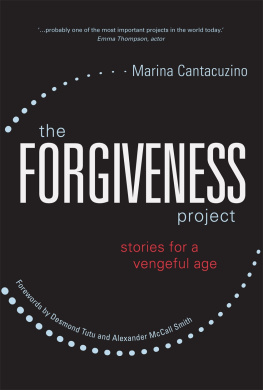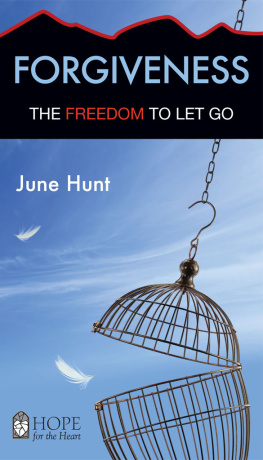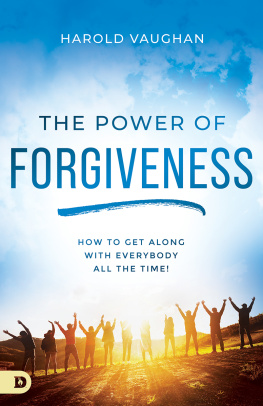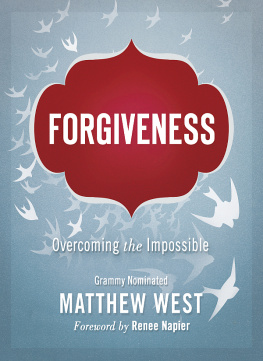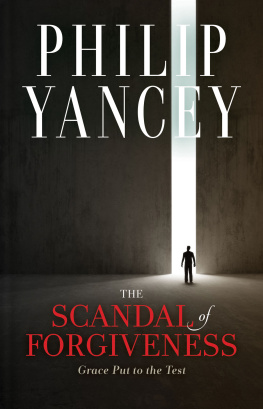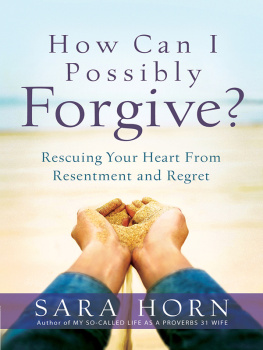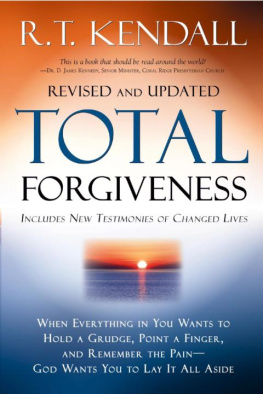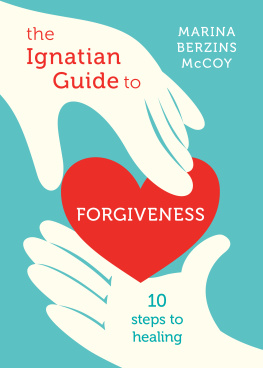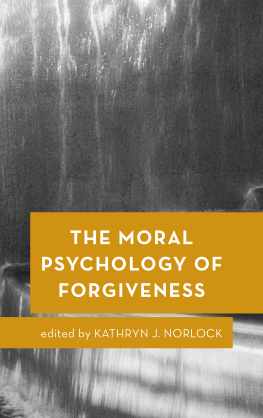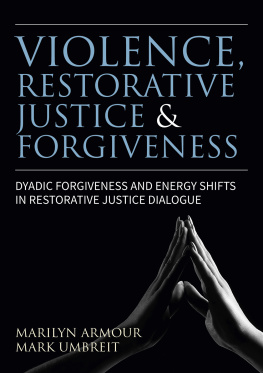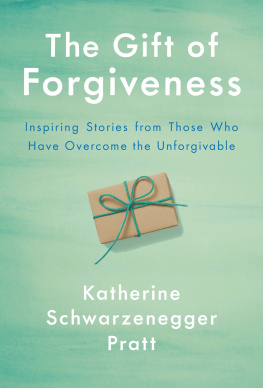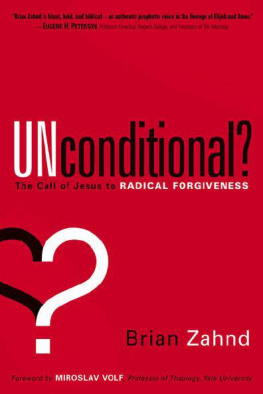Marina Cantacuzino - The Forgiveness Project
Here you can read online Marina Cantacuzino - The Forgiveness Project full text of the book (entire story) in english for free. Download pdf and epub, get meaning, cover and reviews about this ebook. year: 2015, publisher: Jessica Kingsley Publishers, genre: Politics. Description of the work, (preface) as well as reviews are available. Best literature library LitArk.com created for fans of good reading and offers a wide selection of genres:
Romance novel
Science fiction
Adventure
Detective
Science
History
Home and family
Prose
Art
Politics
Computer
Non-fiction
Religion
Business
Children
Humor
Choose a favorite category and find really read worthwhile books. Enjoy immersion in the world of imagination, feel the emotions of the characters or learn something new for yourself, make an fascinating discovery.
- Book:The Forgiveness Project
- Author:
- Publisher:Jessica Kingsley Publishers
- Genre:
- Year:2015
- Rating:5 / 5
- Favourites:Add to favourites
- Your mark:
- 100
- 1
- 2
- 3
- 4
- 5
The Forgiveness Project: summary, description and annotation
We offer to read an annotation, description, summary or preface (depends on what the author of the book "The Forgiveness Project" wrote himself). If you haven't found the necessary information about the book — write in the comments, we will try to find it.
The Forgiveness Project — read online for free the complete book (whole text) full work
Below is the text of the book, divided by pages. System saving the place of the last page read, allows you to conveniently read the book "The Forgiveness Project" online for free, without having to search again every time where you left off. Put a bookmark, and you can go to the page where you finished reading at any time.
Font size:
Interval:
Bookmark:

the
FORGIVENESS
project
of related interest
Shattered Lives
Children Who Live with Courage and Dignity
Camila Batmanghelidjh
ISBN 978 1 84310 434 6 (hardback)
ISBN 978 1 84310 603 6 (paperback)
eISBN 978 1 84642 254 6
Marina Cantacuzino
the
FORGIVENESS
project
stories for a
vengeful age
Forewords by
Archbishop Emeritus Desmond Tutu
and Alexander McCall Smith

Jessica Kingsley Publishers
London and Philadelphia
First published in 2015
by Jessica Kingsley Publishers
73 Collier Street
London N1 9BE, UK
and
400 Market Street, Suite 400
Philadelphia, PA 19106, USA
www.jkp.com
Copyright The Forgiveness Project 2015
Forewords copyright Archbishop Emeritus Desmond Tutu and Alexander McCall Smith 2015
All rights reserved. No part of this publication may be reproduced in any material form (including photocopying or storing it in any medium by electronic means and whether or not transiently or incidentally to some other use of this publication) without the written permission of the copyright owner except in accordance with the provisions of the Copyright, Designs and Patents Act 1988 or under the terms of a licence issued by the Copyright Licensing Agency Ltd, Saffron House, 610 Kirby Street, London EC1N 8TS. Applications for the copyright owners written permission to reproduce any part of this publication should be addressed to the publisher.
Warning: The doing of an unauthorized act in relation to a copyright work may result in both a civil claim for damages and criminal prosecution.
Library of Congress Cataloging in Publication Data
Cantacuzino, Marina, 1959
The forgiveness project : stories for a vengeful age / Marina Cantacuzino.
pages cm
Includes bibliographical references.
ISBN 978-1-84905-566-6 (alk. paper)
1. Forgiveness. I. Title.
BF637.F67.C36 2015
155.92--dc23
2014044096
British Library Cataloguing in Publication Data
A CIP catalogue record for this book is available from the British Library
ISBN 978 1 84905 566 6
eISBN 978 1 78450 006 1
This book is dedicated to all those people who have shared their story with me over the years and provided the source and inspiration for everything I know about forgiveness.
Foreword
For many years now the work of The Forgiveness Project has shown us that true greatness is found in humility and compassion.
The world watched South Africas Truth and Reconciliation Commission with a sense of awe; when victims and perpetrators of gross human rights violations came forward to describe their experiences and actions it had an impact that we could never have foreseen. In post-conflict situations around the world people saw a different model of conflict resolution. Since then, words such as reconciliation and forgiveness have been taken from their more spiritual contexts to become common currency in secular and political conversation. It was as though the world had come to a dead end in finding solutions to resolve intractable problems and the people who came to the TRC to tell their stories shifted the log jam and created new possibilities.
The F Word exhibition that was created by Marina Cantacuzino and opened in London in January 2004 confronts us with images of perpetrators and victims together. They are deeply moving and shocking as they speak to us of our own brokenness in the face of such magnanimity. The exhibition continues to be seen by many people around the world. It is a powerful contribution to the understanding that all of us, given certain circumstances, are capable of the most ghastly atrocities. It is also a testimony to the fact that all of us have the capacity to rise to a generosity of spirit that can transform the world.
To forgive is not just to be altruistic; in my view it is the best form of self-interest. The process of forgiving does not exclude hatred and anger. These emotions are all part of being human. When I talk of forgiveness I mean the ability to let go of the right to revenge and to slip the chains of rage that bind you to the person who harmed you. When you forgive you are free of the hatred and anger that locks you in a state of victimhood. If you can find it in yourself to forgive, you can move on, and you may even help the perpetrator to become a better person. From the stories that Ive heard, read and seen through The Forgiveness Project I have been witness again to the power of forgiveness.
Archbishop Emeritus Desmond Tutu December 2014
Foreword
This book is one of the most powerful, affecting documents I have ever read. The title tells you what it is about forgiveness, a familiar and straightforward enough concept for most of us, even if it is an extraordinarily complex issue when one gets close up to it and starts to scrutinize the subtleties involved. Anybody who has ever accepted anothers apology even for some slight offence has practised forgiveness, but few of us have felt the need to consider the broader implications of this important issue. That is where The Forgiveness Project, Marina Cantacuzinos ground-breaking exploration of forgiveness, comes into its own. This book tells the story of that project, from its early stages of private research and conversations, to its emergence as a growing and increasingly influential movement. It is not a dry historical or philosophical account of the subject far from it: this is a collection of personal testaments that makes for intensely moving reading. These accounts of how forgiveness has been wrestled with by people caught up in personal trauma and tragedy provide fascinating insights into individual lives and into a central moral challenge that each of those lives has encountered.
My own interest in forgiveness arose in the context of my earlier professional involvement with the criminal law. As a law professor I found myself thinking and writing about issues of responsibility: In what circumstances are we fully responsible for actions that may harm others? What excuses do we have? What is the purpose of punishment? These are all lively topics in the academic debate surrounding criminal law, and, indeed, in the everyday practice of the criminal law in the courts. I talked about these issues with colleagues and with students but in many of the discussions that I had there seemed to be a vital element lacking. The criminal law may be prepared to excuse in certain circumstances as where, for example, there has been provocation or coercion but it is not overly concerned with forgiveness. Indeed, in one view forgiveness may even go so far as to defeat some of the aims of the criminal justice system, given that the criminal law has a deterrent role to play. If you tell potential offenders in advance that they will be forgiven, then the efficacy of whatever sanction you may have up your sleeve is considerably reduced.
That may be so, but it still seemed to me that without forgiveness any notion of a rehabilitative or healing system of justice was incomplete. Forgiveness, it seemed to me, provided resolution that the system otherwise could not achieve. Any discussion of responsibility and its consequences without an element of forgiveness was like a symphony without the final movement. Human affairs require resolution, I think, in much the same way that music does. There is a deep human need for it, just as the ear anticipates and yearns for musical resolution.
My interest in forgiveness in that context led me to explore the considerable philosophical literature that had grown up around the subject in the last few decades of the 20th century. That was a period in which an increasing number of philosophers became interested in debating why we needed forgiveness and in what circumstances forgiving was the right thing to do. It is interesting to observe that this philosophical debate had nothing to do with the religious discussion of forgiveness indeed it possibly arose precisely because fewer and fewer people were having the duty to forgive drummed into them as part of their religious education.
Next pageFont size:
Interval:
Bookmark:
Similar books «The Forgiveness Project»
Look at similar books to The Forgiveness Project. We have selected literature similar in name and meaning in the hope of providing readers with more options to find new, interesting, not yet read works.
Discussion, reviews of the book The Forgiveness Project and just readers' own opinions. Leave your comments, write what you think about the work, its meaning or the main characters. Specify what exactly you liked and what you didn't like, and why you think so.

